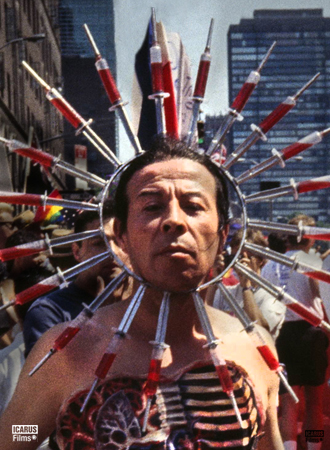
Lemebel 2019
Distributed by Icarus Films, 32 Court St., 21st Floor, Brooklyn, NY 11201; 800-876-1710
Produced by Señal Colombia and Paula Sáenz-Laguna
Directed by Joanna Reposi Garibaldi
Streaming, 96 mins
College - General Adult
Activism; Chile; History
Date Entered: 10/28/2020
Reviewed by Johnnie N. Gray, Technology Services Librarian, Christopher Newport UniversityQueer activist, performance artist, author, and drag queen…are just the easy labels that describe the larger than life Pedro Lemebel. Joanna Reposi Garibaldi worked with Lemebel closely to create this documentary at the end of his remarkable life. He died before it was completed, and it took the director eight years to complete.
The documentary mainly consists of archival footage, artistic performances, and readings, as well as interviews and daily glimpses into Lemebel’s multifaceted life. At the forefront, queer and political activism defines the essence of Lemebel. The viewer sees him use fire and his own body to create art, criticizing and speaking up for oppression. You see him speak at Harvard and perform his famous, “Manifesto” piece. Every aspect of him – from his dress, to his writings are politically charged and defiant – but with Lemebel’s own touch. He speaks of being gay just as much as he speaks out of the horrors of the Pinochet dictatorship and the horrors he lived through. Lemebel curates images for the film as he quips about smoking and his taste in music, watching slides in a projector and narrating. Several performance pieces are recorded, for instance Lemebel writes letters on a road and alights them, knowing he will no longer write because he is dying. Since he had a hand in the creation, with Garibaldi, the film becomes a final statement of his life, his politics, and his role as the voice of queer activism in Chile. Lemebel stood up for all the oppressed in his country – the leftists, women, the poor as well as the LGBTQ community.
A tribute to the fascinating character of Pedro Lemebel consisting of primary sources material and is an excellent introduction to queer activism in other countries. Best used for higher education in subjects such as South American history or Spanish literature. The footage contained in this film is found nowhere else.
Awards:
Teddy Award for Best Documentary/Essay Film, Berlin International Film Festival